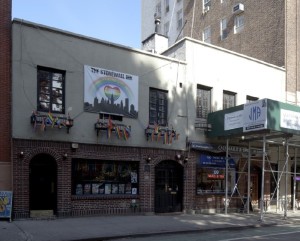
The Stonewall Inn. Image credit: LPC
After acclaim from many quarters to recognize important site in the history of the LGBT-rights movement as a City landmark, Chair Srinivasan stated, “The people have spoken.” On June 23, 2015, the Landmarks Preservation Commission held a hearing on the potential designation of the Stonewall Inn, at 51 Christopher Street. In an unusual step, immediately following the hearing, Chair Meenakshi Srinivasan moved that the Commission proceed directly to a vote on designation. As with the testimony, Commissioner support for designation was unanimous.
The Stonewall Inn, originally constructed as two stable buildings in 1843, was significantly altered over its lifetime to accommodate different commercial uses. The stables were merged and unified in the early twentieth century to accommodate a bakery, which was later taken over by a restaurant called the Stonewall Inn. After a fire, the space reopened in 1967 as a gay club. The site lies within the Greenwich Village Historic District. Landmarks formally added the site to its calendar for consideration early this month on June 2nd.
The Inn is the site of the Stonewall Rebellion, a transformative event in the history of the modern LGBT-rights movement. The mafia-controlled bar was raided by police in the early hours of June 28, 1969, a common occurrence at gay establishments. Instead of acquiescing, patrons fought back against the police, sparking several nights of rioting and protests. Commemoration of the rebellion around the nation and the world eventually became the internationally recognized LGBT Pride month of June. The site’s significance in the LGBT-rights movement is not mentioned in the 1969 district designation report.
The building retains the stuccoed upper levels, arched windows, and brick cladding at the ground floor that it possessed at the time of the rebellion.
Public Advocate Letitia James compared the Stonewall’s role in the LGBT-rights movement to that of Selma, Alabama during the civil rights movement and Seneca Falls, New York in the women’s rights movement. Council Member Rosie Mendez called for Landmarks to move forward with the designation “unequivocally and without hesitation,” saying it was “what my community wants and desires.” A representative of City Comptroller Scott Stringer said the Stonewall was “a national symbol of dignity and defiance.” Other elected officials who supported designation by speaking themselves or through representatives included Assembly Members Deborah Glick and Richard Gottfried, Congressman Jerrold Nadler, Borough President Gale Brewer, State Senator Brad Hoylman, and Council Member Corey Johnson.
Columbia University’s Andrew Dolkart, who spoke in support, said designation would open up new ground for Landmarks to recognize sites with little architectural or aesthetic value, but with significant cultural or historical importance. Attorney Richard Landman compared it to the Brown Building, where the Triangle Shirtwaist Factory disaster took place, similarly designated largely as the site of an important historic event, and said individual designation would give the Stonewall an “extra layer of protection.”
Andrew Berman of The Greenwich Village Society Historic Preservation, which submitted the request for evaluation for the Stonewall, said that the absence of any record of the rebellion in the district designation report left the building “vulnerable to alteration or destruction.” Berman also testified that other sites of importance in Greenwich Village pertaining to LGBT history should be considered for designation. Gabriel Blau, representing the Family Equality Council, testified that designation would signal “dignity and respect for our people.” PFLAG NYC’s Drew Tagliabue called it the “birthplace of the modern struggle for full equality” for LGBT people.
After closing the hearing, Landmarks Chair Meenakshi Srinivasan moved directly to hold a commissioner discussion and vote, saying of the overwhelming support voiced for designation, that “the people have spoken.” Srinivasan called the Stonewall an emblem of “one of the City’s most powerful movements in our era” and remarked on the poignancy of the designation taking place during New York’s Pride Week.
Commissioner Michael Devonshire acknowledged that “this ain’t a pretty building,” but found it merited Landmark status as a representative of “so many things,” including a “period of strength and dignity.” Commissioner Michael Goldblum said the commission faced a “challenge and opportunity” in identifying and regulating landmarks for their social or historical significance, and might have to develop new tools and ways of the thinking about preservation. Recognizing the 2015 anniversary of the landmarks law, Goldblum said the designation of the Stonewall Inn was “a great first step for the next 50 years.”
LPC: Stonewall Inn, 51-53 Christopher Street, Manhattan (LP-2574) (June 23, 2015).
By: Jesse Denno (Jesse is a full-time staff writer at the Center for NYC Law)

